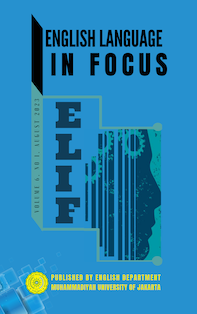Exploring EFL Secondary English Club Students’ Challenges of the Use of British Accent in Speaking Classroom
DOI:
https://doi.org/10.24853/elif.7.1.%25pKeywords:
British Accent, Challenges, Speaking Classroom.Abstract
Exploring EFL Secondary English Club Students' Challenges with the Use of British Accent in Speaking Classroom is the focus of this study. One of the more challenging accents that students can master in English club is the British accent. The learner can discuss their difficulties in the speaking classroom while using a British accent. This study used an approach with an interview as part of its descriptive qualitative methodology. Three English club students from a vocational high school in Jakarta participated in this study. Nine interview questions helped gather the data for this study. The goal of this study is to examine the difficulties that EFL Secondary English Club Students face when using a British accent in speaking classes. The researcher draws the conclusion that the student's difficulties employing a British accent are constructive based on the findings of the data analysis. The student who uses a British accent in the speaking class presents the most challenge. According to the interview questions, the students approve of the obstacles associated with the British accent in speaking classes. The students respond favorably to the difficulties.References
Britain, D., & Trudgill, P. (1999). Migration, new‐dialect formation and sociolinguistic refunctionalisation: reallocation as an outcome of dialect contact. Transactions of the Philological Society, 97(2), 245-256.
Dirgeyasa, I. W. (2015). Reviewing the British English (BRE) and American English (AME) Dialects. Language Circle: Journal of Language and Literature, 9(2).
Fraenkel, J. R., Wallen, N. E., & Hyun, H. H. (2012). How to design and evaluate research in education (Vol. 7, p. 429). New York: McGraw-hill.
Gunawan, A., & Aminah, N. (2020). English Students’ Awareness of American and British Variety of English’s Differences. Lingua, 16(1), 36-52.
Herawati, I., & Istinganah, E. L. (2022). Students’ Perception of English as Global Language. Aplinesia (Journal of Applied Linguistics Indonesia), 6(1), 18-25.
Hermini, H. (2019). Students’perception Toward American and British English in Cokroaminoto University. IDEAS: Journal on English Language Teaching and Learning, Linguistics and Literature, 7(1).
Horobin, Simon. (2016). How English Became English. Oxford: Oxford University, Press.
Hughes, A., Trudgill, P., & Watt, D. (2012). English Accents & Dialects (Fifth). Retrieved from http://www.ghbook.ir/index.php?name=فرهن گ و رسانه های نوین&option=com_dbook&task=readonline&book_id=13650&page=73&chkhashk=ED9C9491B4&Itemid=218&lang=fa&tmpl=component
Kachru, B. (2008). World Englishes: Approaches, issues, and resources. Cambridge University Press, 25(1).
McKenzie, Y. A., Bowyer, R. K., Leach, H., Gulia, P., Horobin, J., O'Sullivan, N. A., ... & (IBS Dietetic Guideline Review Group on behalf of Gastroenterology Specialist Group of the British Dietetic Association). (2016). British Dietetic Association systematic review and evidence‐based practice guidelines for the dietary management of irritable bowel syndrome in adults (2016 update). Journal of Human Nutrition and Dietetics, 29(5), 549-575.
Talenta, P. I., & Wibowo, R. A. (2022). The Impacts of British Accents on Students’ Dialects in a Speaking Class. English Language and Education Spectrum, 2(1), 18-23.
Wei, R., & Su, J. (2012). The statistics of English in China: An analysis of the best available data from government sources. English Today, 28(3), 10–14. https://doi.org/10.1017/S0266078412000235
Published
Issue
Section
License
Authors who publish with this journal agree to the following terms:
- Authors retain copyright and grant the journal right of first publication with the work simultaneously licensed under a Creative Commons Attribution License that allows others to share the work with an acknowledgment of the work's authorship and initial publication in this journal.
- Authors can enter into separate, additional contractual arrangements for the non-exclusive distribution of the journal's published version of the work (e.g., post it to an institutional repository or publish it in a book), with an acknowledgment of its initial publication in this journal.
- Authors are permitted and encouraged to post their work online (e.g., in institutional repositories or on their website) before and during the submission process, as it can lead to productive exchanges, as well as earlier and greater citation of published work (See The Effect of Open Access).

